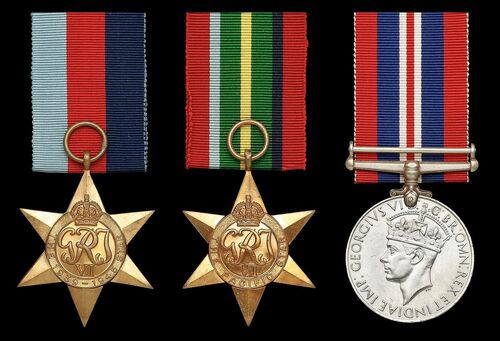
Auction: 23113 - Orders, Decorations and Medals - e-Auction
Lot: 527
The campaign group of three awarded to Corporal B. J. D. Hockley, Royal Air Force, who served at Alor Star for the opening shots of the Battle of Malaya; he would surely have observed the crash-landing of Squadron Leader Scarf on 9 December 1941 in the act of winning his Victoria Cross
Hockley himself was then captured and taken Prisoner of War by the Japanese in Java on 8 March 1942, and was held captive as part of the ‘Haruku Draft’ in the Spice Islands, during which he participated in regular acts of sabotage
1939-45 Star; Pacific Star; War Medal 1939-45, with ‘ticker tape’ medal entitlement and rank/number slip, in named card box of issue, addressed to ‘Mr. B J D Hockley, 84 Uplands Road, Woodford Bridge, Essex, IG8 8JW’, all somewhat later issues, extremely fine (3)
Basil James Dennis Hockley was born at Halstead, Essex, on 22 April 1920, and joined the Royal Air Force on 5 October 1938. Sent out to Malaya, he was stationed at R.A.F. Alor Star, near the border with Thailand, in the north of Malaya, when the Japanese attacked on 8 December,1941. He was evacuated by road with the ground personnel from R.A.F. Alor Star, and over successive months, they made their way down through the country, to Singapore. Before the Garrison fell on the 15 February 1942, he and his colleagues were embarked for Java, where, at Tasikmalaya, on 8 March 1942, following further Japanese operations in the Dutch East Indies, he was captured, and taken prisoner of war.
Over the ensuing three and a half years, Hockley suffered the privations common to all Far East Prisoners of War, but on 4 May 1943, he had the misfortune to be sent to one of the worst places for prisoner treatment - Haruku, in the Spice Islands. Transferred to a forced labour party of just over 2,000 men for construction of an airstrip at Haruku, Molucca Islands, through deprivation, disease, and routine Japanese brutality, less than half of the workforce of the ‘Haruku Draft' survived the ordeal.
After further spells in camps in Batavia and Singapore, Hockley was finally liberated on 2 September 1945, and his M.I.9. Questionnaire states:
‘Sabotage. Did you do any sabotage: Carried out at every available opportunity general sabotage such as emptying drums, mixing seawater with petrol, tipping bombs in the sea when unloading ships, slight damage to motor vehicles, covering up faulty work when building bridges, runways, filling bomb craters etc., etc.’
A life-long member of the Far East Prisoners of War Association, Hockley died in King’s Lynn, Norfolk, in 1999; sold with the recipient’s F.E.P.O.W. Association Life Membership Card and copied research.
Subject to 20% VAT on Buyer’s Premium. For more information please view Terms and Conditions for Buyers.
Sold for
£200
Starting price
£70




